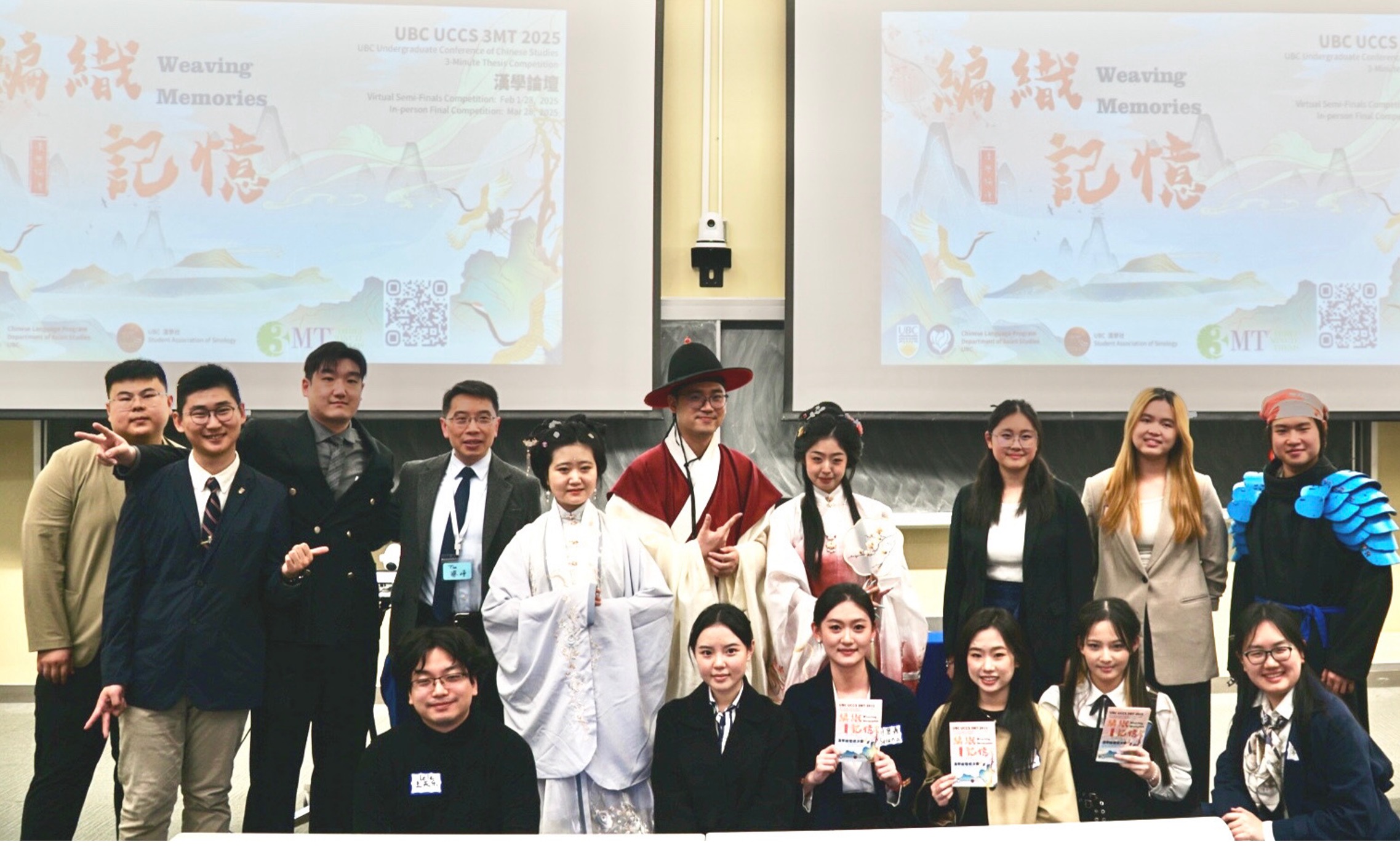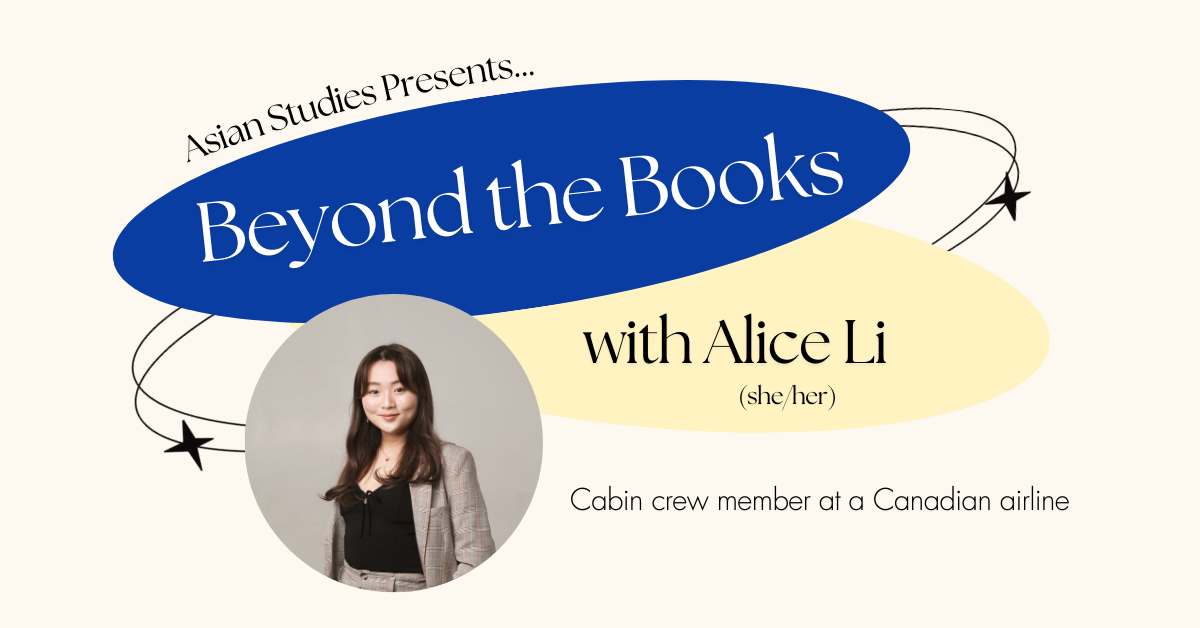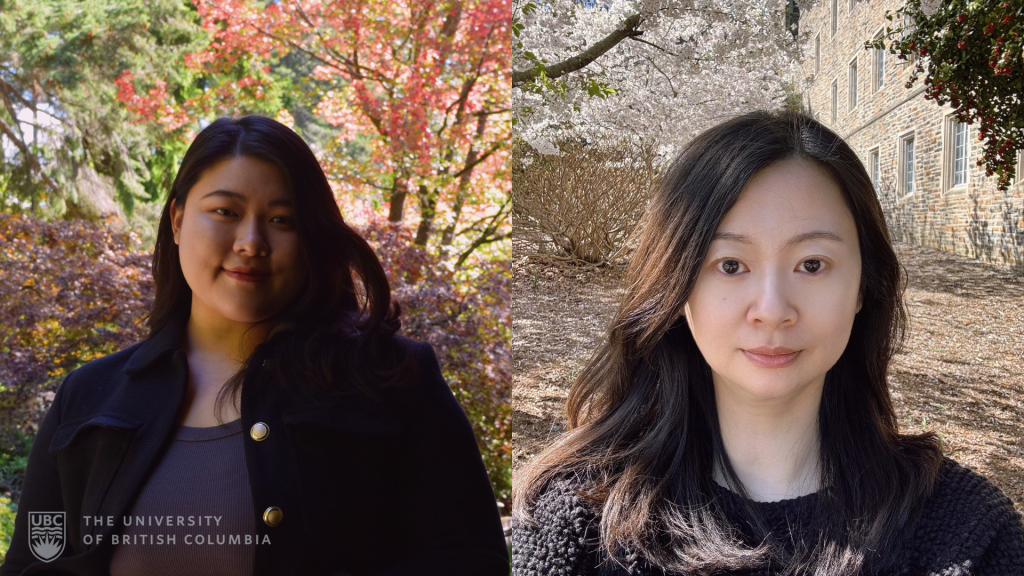

Meet the UBC CLP’s visiting lecturers: Chia-yin Yu (left) and Shu-ting Hsu (right)
The UBC Chinese Language Program (CLP) is delighted to introduce two inspiring new visiting lecturers—Chia-yin Yu and Shu-ting Hsu. As the page turns to a new academic chapter, we have the privilege of diving into the stories of passion and innovation these educators bring to the world of Chinese language instruction.
Get ready to be captivated by the dynamic teaching approaches, creative methodologies, and educational insights that Chia-yin Yu and Shu-ting Hsu bring to our program. Their dedication and expertise are sure to inspire and elevate the learning experience within the Chinese Language Program.
Visiting Lecturer Chia-yin Yu
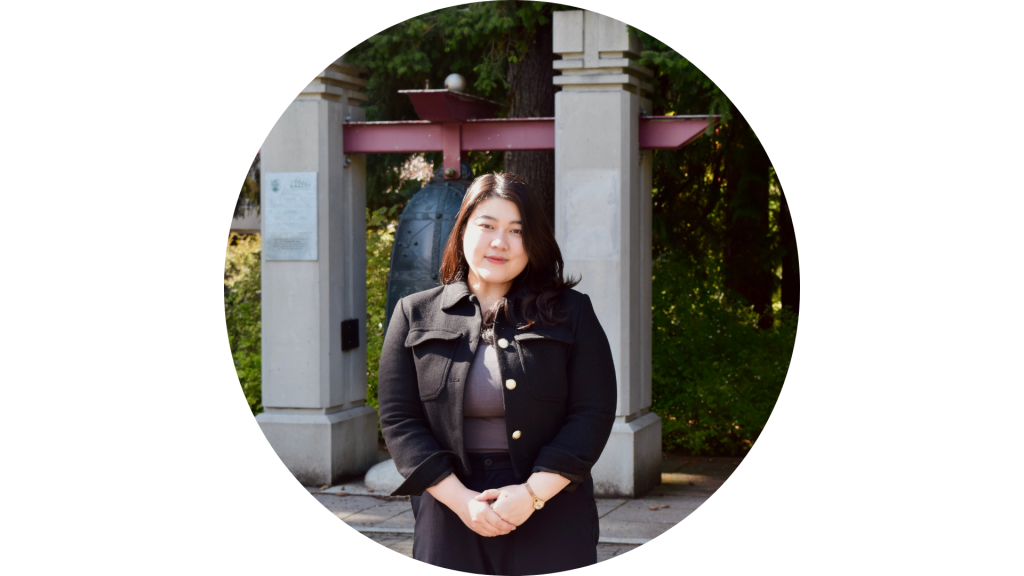

Meet Chia-yin Yu Laoshi
1. Could you tell us a little about yourself? We’d love to hear about your background and what inspired you to both learn and teach the Chinese language.
I am an overseas Chinese from Korea, but upon graduating middle school in Korea, I moved to Taiwan to experience a term abroad and learn about Chinese heritage and culture.
2. What inspired your passion for teaching Mandarin, and what made UBC the perfect fit for your career?
During my time in high school, I began teaching Korean to Taiwanese students, an experience that became a turning point and inspired my passion for language teaching. What drew me to UBC was the incredibly diverse range of research areas, backgrounds, and perspectives among the students, colleagues, and the broader community. I realized that joining UBC would provide me with the opportunity to learn from these diverse experiences, deepen my understanding of other cultures, and enhance my teaching skills. Ultimately, I hope to integrate these insights into my own teaching approach.
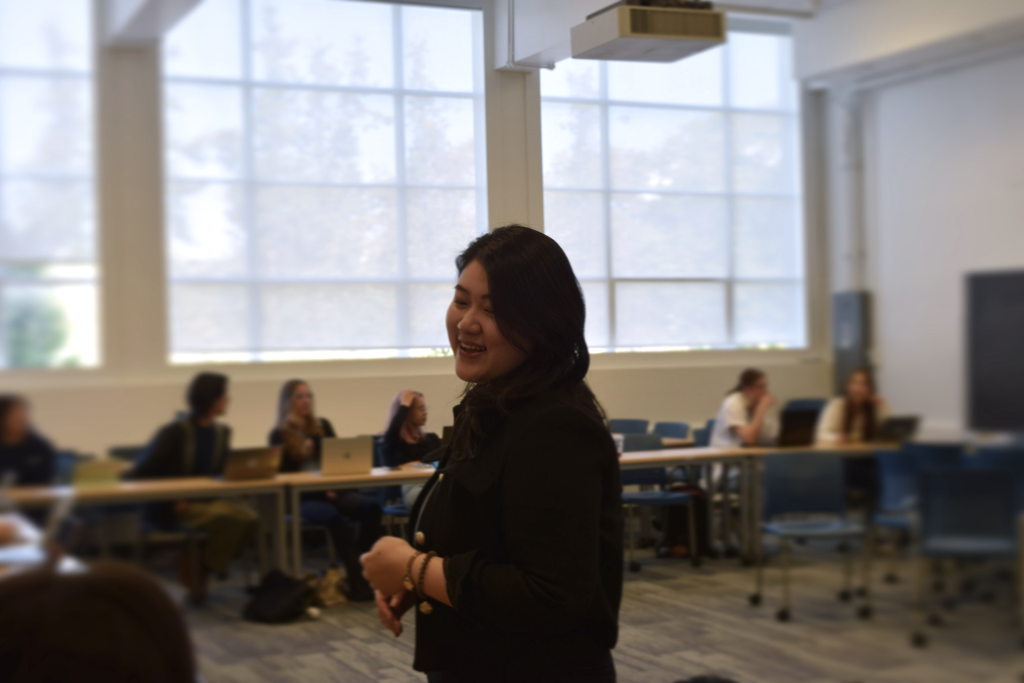

Chia-Yin Yu Laoshi engaging in lively discussions with her students in class
3. How would you define your teaching philosophy? Are there any particular methods or techniques that make your Mandarin classes stand out?
When learning a language, it’s essential to have a clear purpose behind it. Defining our language learning goals is key to achieving success. I recognize that each of my students has a unique motivation for learning Chinese, and my goal in the classroom is to nurture and support them in that journey. For instance, when working with beginners, I focus on providing plenty of encouragement and opportunities to practice using the language and vocabulary in a variety of real-life scenarios, guiding them towards specific goals.
To create an immersive learning environment, I encourage my students to actively speak the language and explore the cultural aspects associated with it. Our class discussions are highly practical, designed to equip students with the skills they need to handle real-world encounters and situations while expanding their grammar and vocabulary. Students particularly enjoy interacting with one another and applying what they’ve learned in different scenarios. My ultimate goal with this diverse and interactive approach is to help students build the confidence to use their language skills beyond the classroom.
4. What are some common challenges students face when learning Mandarin, and how do you support them in overcoming these obstacles?
As I teach both heritage and non-heritage classes, I observe distinct differences in the language learning process across these diverse student demographics. Having been a heritage student abroad myself, I feel a strong connection with my heritage students, as their challenges often reflect my own past experiences. I understand firsthand the struggles they face, and this allows me to relate to their learning journey on a deeper level.
One common challenge for both heritage and non-heritage students is building confidence in speaking. To help them overcome this, I emphasize active participation and encourage them to speak up in class. It’s important to recognize that every student’s language learning experience is unique, and their confidence levels vary. However, when the entire class is working toward a shared goal, the classroom transforms into a supportive, collaborative space. In this environment, we lift each other up, fostering a sense of teamwork and mutual growth.
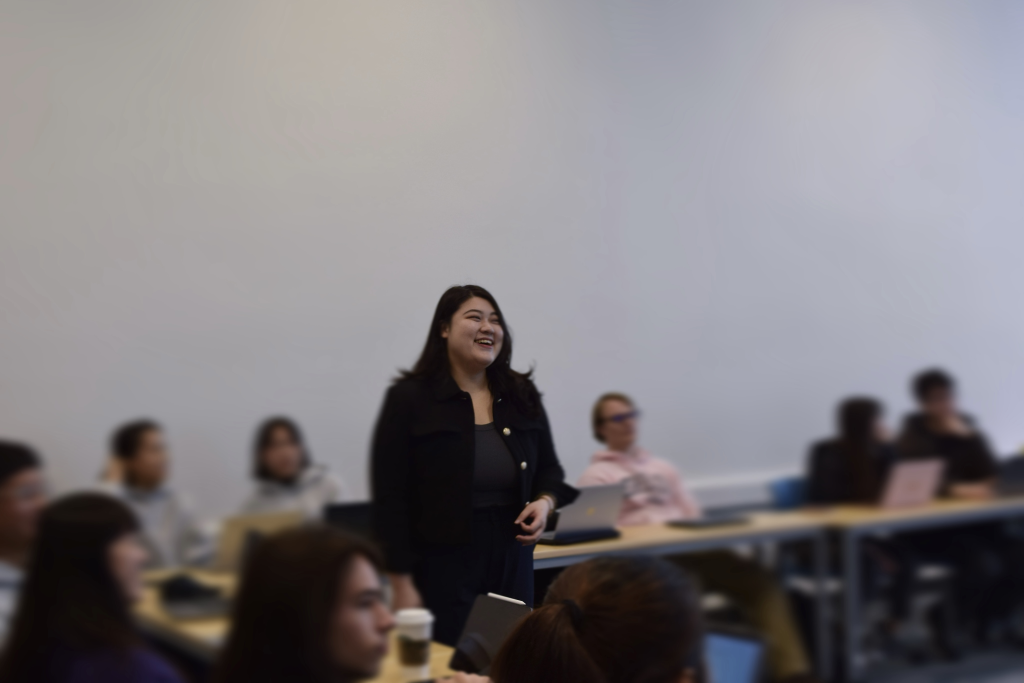

Chia-Yin Yu Laoshi teaching in an interactive classroom session
5. Could you share a memorable experience or success story from your teaching that demonstrates the impact of your instruction?
One of my fondest memories comes from my time teaching in Taiwan. I had a student from the United States who enrolled in a summer program to learn Chinese. At the start, he approached the language with a shy and hesitant attitude, clearly feeling intimidated. However, by the end of the program, he had transformed into a much more confident and outspoken learner.
What touched me the most were the words he shared at the conclusion of the program. He expressed deep gratitude for the encouragement and support I provided, which helped him stay motivated and continue his language learning journey. His biggest takeaway was that learning Chinese could be both interactive and enjoyable. Moments like these are incredibly rewarding for any educator and truly feel like the greatest achievement as a teacher.
Visiting Lecturer Shu-ting Hsu
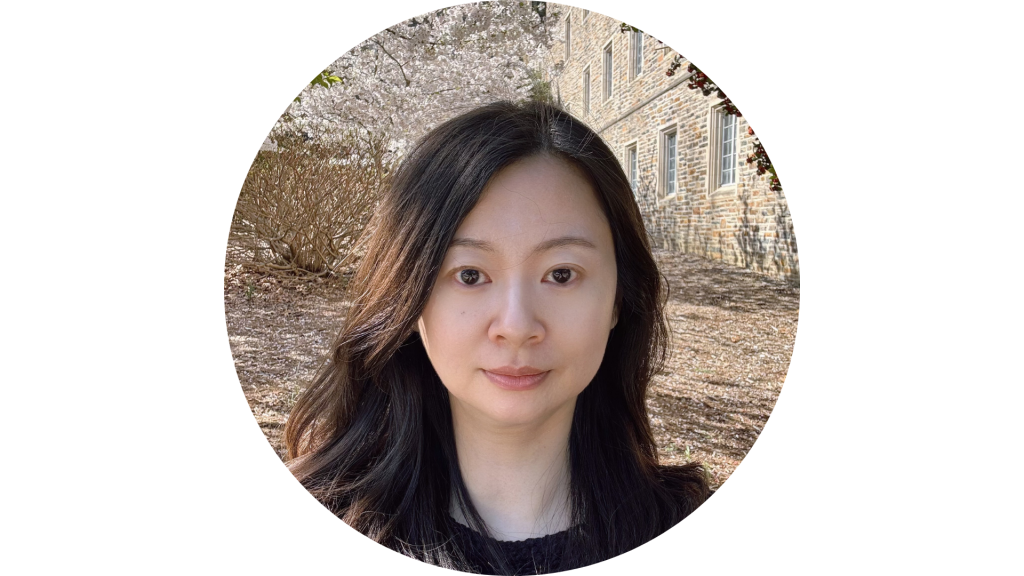

Meet Shu-ting Hsu Laoshi
1. Can you share a little about yourself? What inspired your journey into learning and teaching Chinese?
Studying Chinese Literature at the National Cheng Kung University in Taiwan was where my passion for teaching Chinese first ignited. My university mentor, also the director of the university’s language center, encouraged us to attend a teacher training program for Chinese language instructors, which marked my first introduction to the field of Chinese language education. During the summer of my third year, I began working at the language center at National Cheng Kung University. There, I helped international students adjust to their new environment and served as a language partner. Answering their numerous language-related questions made me realize how fascinating Chinese grammar is and deepened my passion for teaching. In my final year, I completed the Teaching Chinese as a Second Language program and taught at NCKU’s language center as an individual session instructor for another year.
To further develop my professional skills, I pursued a master’s degree in Teaching Chinese as a Second Language at the National Taiwan Normal University. Since graduate school, I have gained teaching experience across various institutions in Europe, Asia, and North America. Each setting had its own unique materials, class sizes, and student backgrounds, which helped me adapt my teaching methods to meet the diverse needs of learners. The seven years I spent at Duke University greatly shaped my teaching philosophy and approach to course design. This experience broadened and deepened my understanding of Chinese language education, laying a strong foundation for my teaching career.
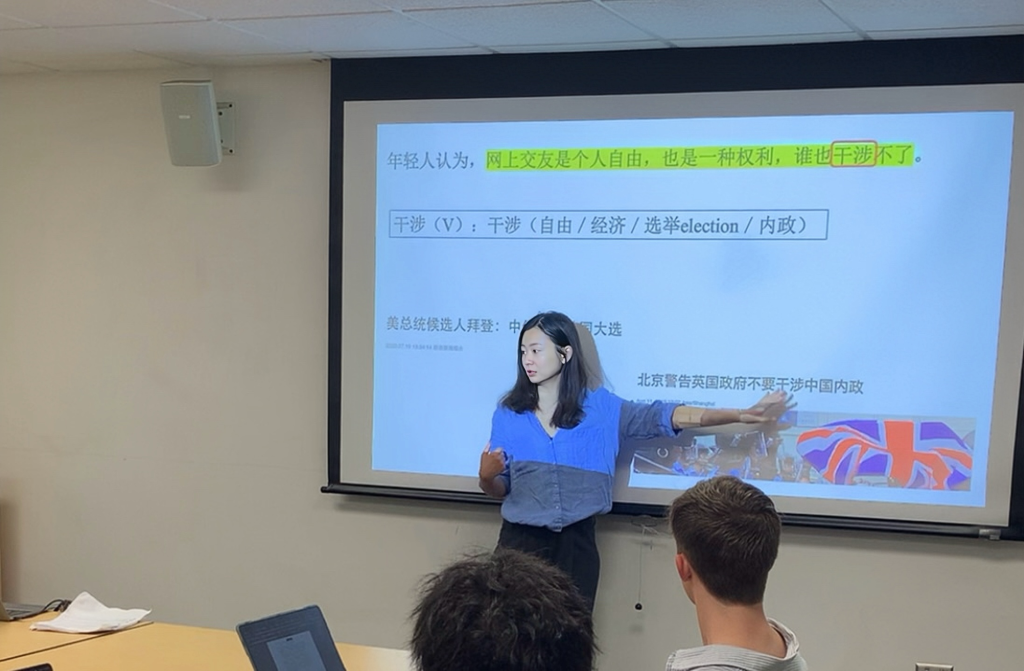

Shu-ting Hsu Laoshi facilitating an interactive discussion with her students
2. What sparked your passion for teaching Mandarin, and what led you to choose UBC as your teaching destination?
When I was younger, I had dreams of studying abroad; however, at that time, it was out of reach. I was also curious about different perspectives and ways of thinking around the world and wanted to live abroad for more than just short trips. As the global demand for learning Chinese increased, I realized that becoming a Chinese teacher could not only offer me the opportunity to travel but also allow me to work and support myself overseas. It seemed like the perfect way to explore different parts of the world and potentially settle down in a place I loved.
In my own experience of learning languages, I encountered teachers who deeply inspired me, which made me realize how much impact a teacher can have on their students. One of the most influential teachers I met was my German teacher at Heidelberg University. She was passionate and principled in her teaching, with incredible patience and care for her students. Even in a beginner class, she taught nearly entirely in German with clarity and precision. She also showed great compassion and understanding towards students from diverse cultural backgrounds and with different learning speeds. Her approach left a lasting impression on me, inspiring me to become a teacher who not only guides students with clarity and care but also provides the support they need to succeed.
Having worked in Germany, the United States, Beijing, and Taiwan, I was drawn to Vancouver because it combines the best aspects of Europe, Asia, and America. It’s a multicultural city where different communities come together, making it a great place for personal and professional growth. I chose UBC because it offers a chance to further expand my teaching experience in an international environment, and I’m excited to learn and grow alongside my students while also discovering new aspects of myself in this vibrant city.
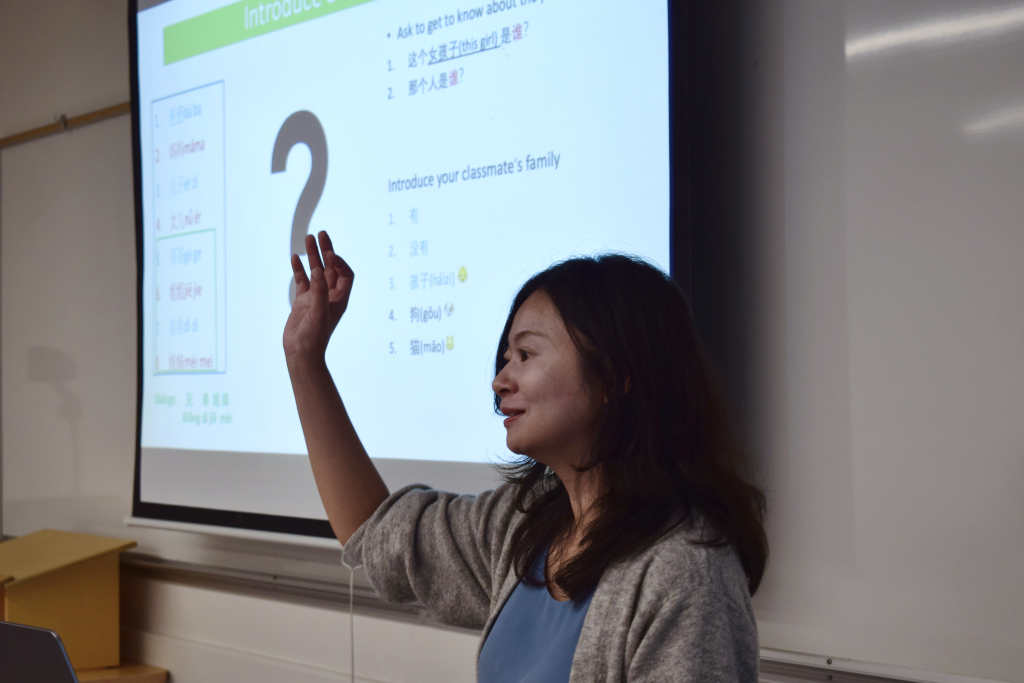

Shu-ting Hsu Laoshi posing a thought-provoking question during a dynamic classroom session
3. How would you describe your unique approach to Mandarin instruction? Do you use any standout strategies or methods in your classes?
My teaching philosophy is student-centered, focusing on creating a communicative and practical learning environment. I believe that effective Mandarin instruction should integrate students’ personal experiences, with real-world applications and community engagement enhancing their overall learning experience.
I design lessons that resonate with students’ lives, ensuring the content is relevant and relatable, which helps them form a personal connection with the language. In the classroom, I strive to foster an interactive, dynamic, and supportive atmosphere that encourages students to challenge themselves and elevate their language skills. Through discussions, debates, and task-based activities, students not only learn the language but also engage in critical thinking about cultural and societal issues.
Additionally, I incorporate service-learning and community-based language learning into my courses, providing opportunities to apply what they’ve learned in real-life contexts. This approach strengthens their language abilities while fostering social responsibility and increasing motivation as they witness the direct impact of their learning.
These methods create a meaningful and engaging learning experience that sets my classes apart.
4. What are some common hurdles students face when learning Mandarin, and how do you help them navigate through these challenges?
This topic can be explored in depth, as the common challenges faced by students of varying levels and backgrounds differ significantly. For non-heritage beginners, the most common difficulties include mastering the Chinese tones and characters. Additionally, certain aspects of Chinese grammar, such as the ‘ba’ sentence structure, lack direct equivalents in English, which can complicate comprehension. To address these grammar learning challenges, I reinforce essential language structures while emphasizing their functions and contextual use.
By designing typical real-life scenarios, I clarify the purpose of language use, enabling students to naturally acquire grammar and apply what they’ve learned in appropriate contexts. Furthermore, I avoid relying too heavily on English translations in my teaching approach to prevent students from becoming overly dependent on word-for-word translations, thereby promoting a more intuitive grasp of the language.
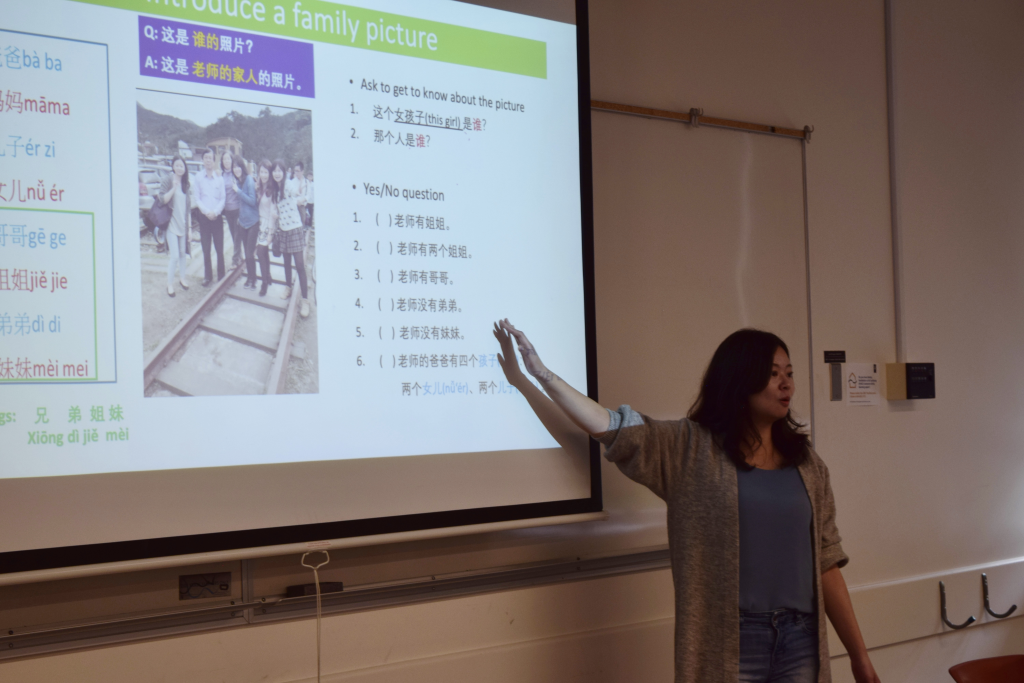

Hsu Laoshi encouraging an active exchange of ideas during class
5. Can you share any standout success stories or memorable moments from your teaching career that highlight the impact of your work?
One of the most memorable experiences in my teaching career was when I integrated community service into my advanced courses, which had a profound impact on both heritage and non-heritage students. I remember one of my heritage students who had always been hesitant about learning Chinese and without strong motivation. He often expressed doubts about his ability to connect with his Chinese heritage. But after participating in community service, he transformed completely. He rediscovered his passion for the language and began to appreciate not just his linguistic abilities but also the richness of his background. Seeing that shift was incredibly moving.
Students described the experience as one of their most rewarding at Duke, using their language skills in real-world settings and mentoring younger learners at local schools. I still remember how excited they were to mentor younger Chinese learners and help with language tutoring at local schools. One student told me that working with community partners and using Chinese in unstructured, everyday situations opened up a whole new world for him—far beyond what we could achieve in the classroom. One student even connected with a local elementary school serving African American students, becoming aware of the disparities in Chinese language resources between public and private schools.
Through these experiences, students not only enhanced their language abilities but also developed civic responsibility and a broader perspective on their impact. Witnessing their growth and newfound confidence was truly one of the highlights of my teaching journey, especially regarding their limited resources for teaching Chinese compared to private institutions.
Our esteemed visiting lecturers have graciously shared their wealth of knowledge, experiences, and passion for language learning. Whether you’re a beginner or a fluent speaker, their insights offer valuable takeaways for every Chinese language learner.
We extend our heartfelt thanks to them for their time and willingness to share their inspiring journeys. Until our next spotlight, may your language-learning adventures continue to illuminate new horizons!
Find out about the latest news through our website and stay tuned for future events and exciting content by following us on social media @UBCChinese. Join us as we continue to celebrate the beauty and transforming power of language learning!

